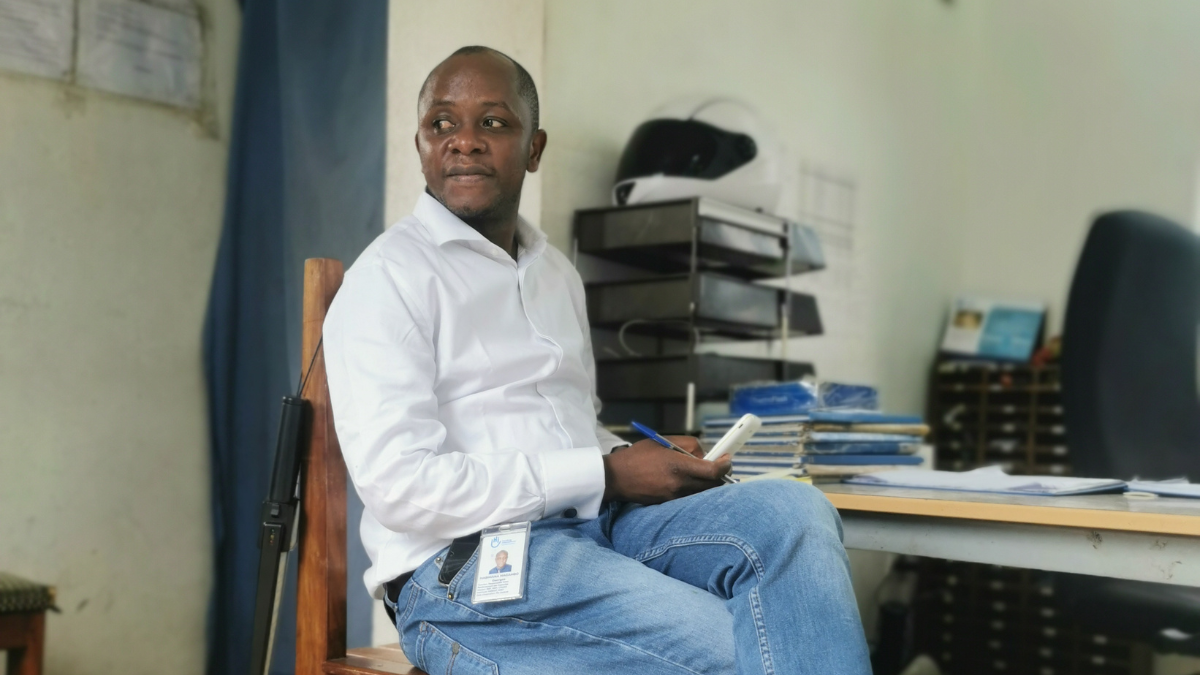Teaching as a two-way process
Georges, a former biology teacher, has been working for Atlas Logistics in the Democratic Republic of Congo for the past year as a logistics capacity-builder. Based in Goma, he's turning his teaching experience into an asset for the humanitarian sector.
"What I like about teaching is sharing experience. When we teach, we also learn things every day," he says. "Training adults means exchanging ideas and receiving constant feedback.”
Logistic challenges in conflict zones
George works in North Kivu, a province beset by complex humanitarian crises. The security situation, marked by recurring clashes, complicates humanitarian access, which is already limited by physical constraints (poor road conditions, lack of infrastructure) and difficult geographical and climate conditions. These same difficulties are also a barrier to the delivery of humanitarian aid and social services in the most isolated areas of the province. Conflicts, such as those involving the armed group March 23 Movement (M23), have displaced millions of people since November 2022. Georges is a long way from his family, who live in Bukavu, South Kivu, but he continues to train professionals and deal with logistical obstacles in this often-difficult context as part of an ECHO-funded Logistics Platform project.
"Our mission is to train logistics professionals so that they know how to handle the difficulties that can arise in the region," he explains.
Helping those who help: capacity-building
Atlas Logistique delivers key training modules in transport operations management, stock management, and pharmaceuticals and cold chain management. These courses systematically include crosscutting subjects, such as humanitarian principles and ecology.
These modules are essential for organizations that often do not have the resources to invest in staff training. Their objective is to strengthen the competencies of these professionals to improve the entire logistics chain and therefore the humanitarian response in North Kivu as a whole.
"We're looking to make logistics more accessible and efficient, as it plays a vital role," says Georges.
Measuring and ensuring the quality of the training
To assess the effectiveness of its training modules, Atlas Logistics administers pre- and post-tests to its participants to determine the degree to which they have acquired the knowledge, skills and information imparted. Hugues Llunga, a participant in the transport and stock management modules, testifies to the impact:
"I have acquired essential skills for managing loads to be transported and stored. This training is crucial to our ability to adapt to logistical challenges."
Another participant stressed the importance of keeping up to date on current developments, particularly in relation to the climate crisis and ecological issues.
"I'd never had anything explained to me about ecology and thanks to this course I now have a basic understanding of waste management and how to protect our planet from global warming.”
Far-reaching impact but huge needs remaining
The efforts of Georges and Atlas Logistics are concentrated in North Kivu, but the needs are vast throughout the eastern region of the DRC. Georges hopes that their initiatives can be extended further.
"We go where insecurity and natural disasters make humanitarian work particularly difficult," he says. "It is crucial to support our partners so that they can achieve their objectives.”
 The engagement of Georges and his team at Atlas Logistics is an inspiring example of how improving local logistics competencies can enhance the effectiveness of the humanitarian response in crisis contexts. Their work is not limited to one region or one task, but covers the full range of challenges facing humanitarian organizations in the Democratic Republic of Congo.
The engagement of Georges and his team at Atlas Logistics is an inspiring example of how improving local logistics competencies can enhance the effectiveness of the humanitarian response in crisis contexts. Their work is not limited to one region or one task, but covers the full range of challenges facing humanitarian organizations in the Democratic Republic of Congo.
This capacity-building activity is being implemented with the support of the European Union. The European Union and its Member States are among the world's leading donors of humanitarian aid: https://civil-protection-humanitarian-aid.ec.europa.eu.
Through the Directorate-General for Civil Protection and Humanitarian Aid Operations (ECHO), the European Union helps millions of victims of conflicts and disasters every year. The views and opinions expressed are, however, those of HI and do not necessarily reflect those of the European Union. Neither the European Union nor the granting authority can be held responsible for them.




 The engagement of Georges and his team at Atlas Logistics is an inspiring example of how improving local logistics competencies can enhance the effectiveness of the humanitarian response in crisis contexts. Their work is not limited to one region or one task, but covers the full range of challenges facing humanitarian organizations in the Democratic Republic of Congo.
The engagement of Georges and his team at Atlas Logistics is an inspiring example of how improving local logistics competencies can enhance the effectiveness of the humanitarian response in crisis contexts. Their work is not limited to one region or one task, but covers the full range of challenges facing humanitarian organizations in the Democratic Republic of Congo.


